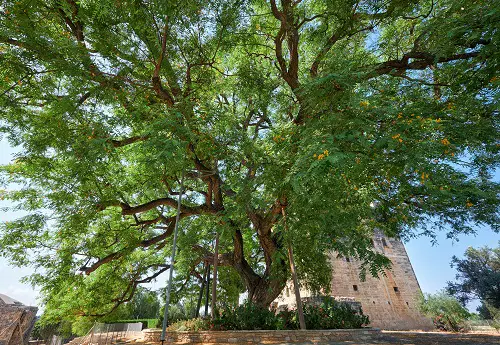Take a look at our pick of trees whose names start with the letter R. Read on to enhance your gardening vocabulary!
We like it when anything and everything around us reminds us to rush to the garden and love up the flora in our space—even letters of the alphabet! Today, we’re focusing on trees that start with the letter R.
Whether you’re planning your next garden addition or are simply curious, this list will surely inspire you to step out and awaken the gardener in you!
Trees that Start with R
1. Rain Tree
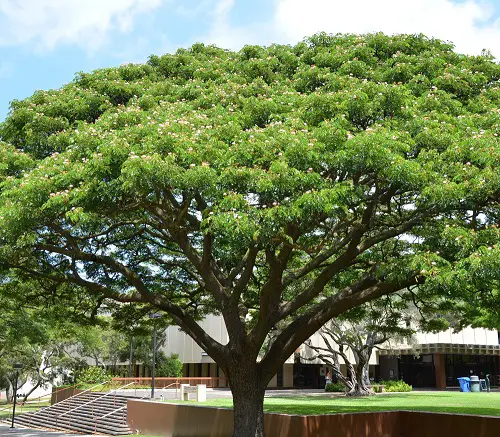
Botanical Name: Samanea saman
Also known as the 5’o clock tree, the leaves of this wide-canopied tropical tree fold up before a downpour or late in the evening. Native to Central and South America, it belongs to the pea family and produces leathery pink flowers and edible pulpy fruits that taste a bit like lemons.
Reaching heights of up to 80 feet, its umbrella-shaped crown provides ample shade and is often used in landscaping in USDA Zones 9-11.
2. Red Maple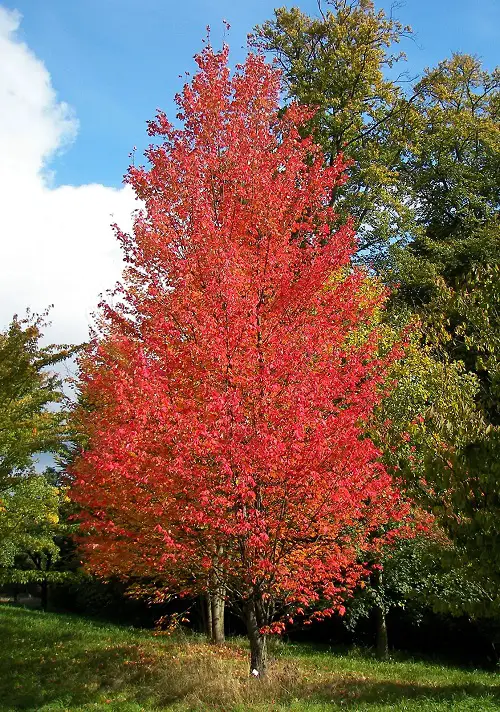
Botanical Name: Acer rubrum
Red Maple is a deciduous tree adored for its color-changing foliage. This tree flourishes in high altitudes as well as swamps and lowlands in the northeastern parts of the US. As fall approaches, you’ll find its serrated leaves turn a shade of deep pink to red.
It tolerates a wide range of soil types, including different textures, moisture levels, and pH.
3. River Birch
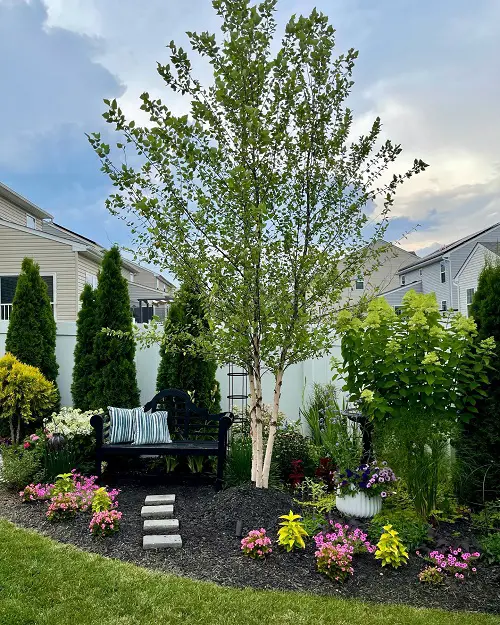
Botanical Name: Betula nigra
Almost all parts of this tree are quite intriguing! One of the most disease-resistant birches, this deciduous tree native to Missouri can grow up to 70 feet! Sporting bright yellow foliage and golden flowers, it tolerates heavy clay soil and full sun to part shade.
While highly adaptable, this tree does love moist conditions and can be commonly spotted near river beds.
4. Redbud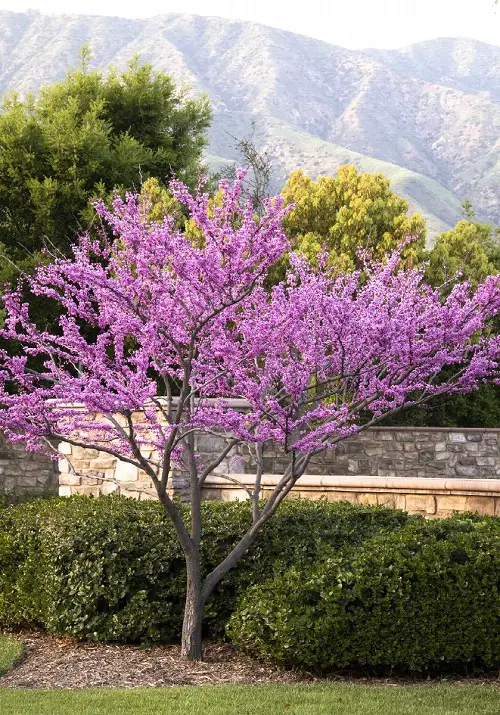
Botanical Name: Cercis Canadensis
Next on our list of trees that start with R is another native to the eastern parts of North America—the redbud. Although smaller than the others above, its heart-shaped leaves and nectar-filled bright pink to purple flowers overshadow its compact size.
This tree attracts butterflies, bees, and songbirds and is common in woodland areas. It tolerates full sun to part shade but cannot withstand drought or too much heat. It grows well in fertile clay or sandy soil.
5. Rimu
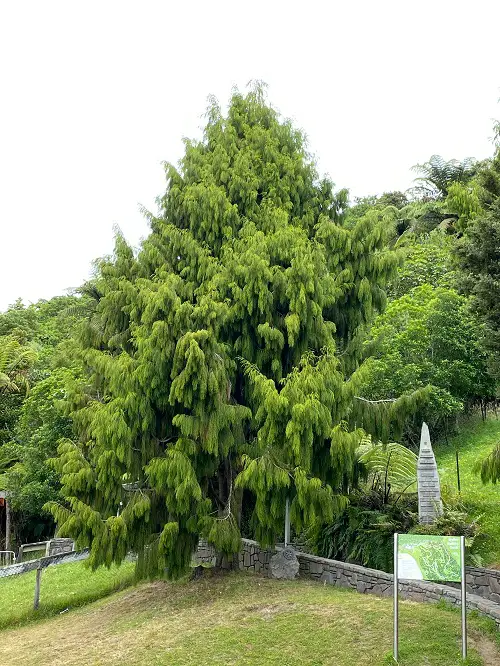
Botanical Name: Dacrydium cupressinum
Scaling up to 150 feet or more, Rimu is a conifer native to New Zealand. It has dark red wood, which used to make furniture and finger-like spikey leaves that appear bushy. You can tell that a table is made out of Rimu if it features unique light and dark streaks.
This slow grower has a long period of adolescence with high moisture needs. But it is captivating at all its growth stages, from young, slender, and narrow to upright and imposing as an adult!
6. Rock Elm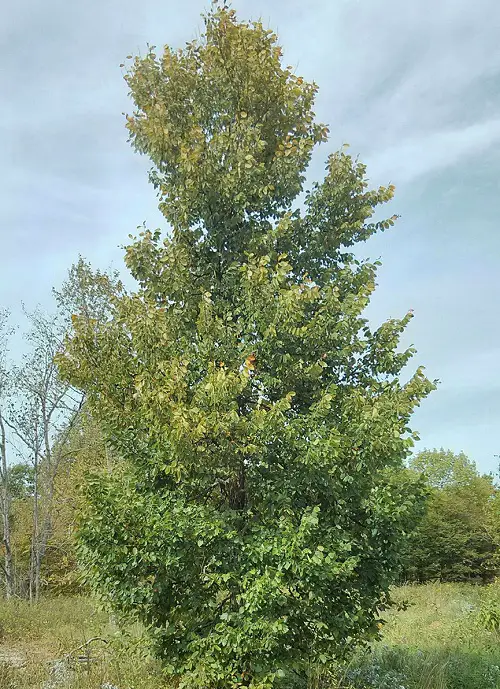
Botanical Name: Ulmus thomasii
Rock Elm is much like a regular elm tree, only taller and skinnier. Growing up to 100 feet and living up to 300 years, this midwestern US native has an upright growth habit, with older branches featuring corky wings—hence the alternative name, cork elm!
It tolerates shade and prefers moist, well-draining sandy loam or silt soil. Rock elm can also grow in drier conditions, such as rocky ridges or limestone bluffs.
7. Ribbon Gum
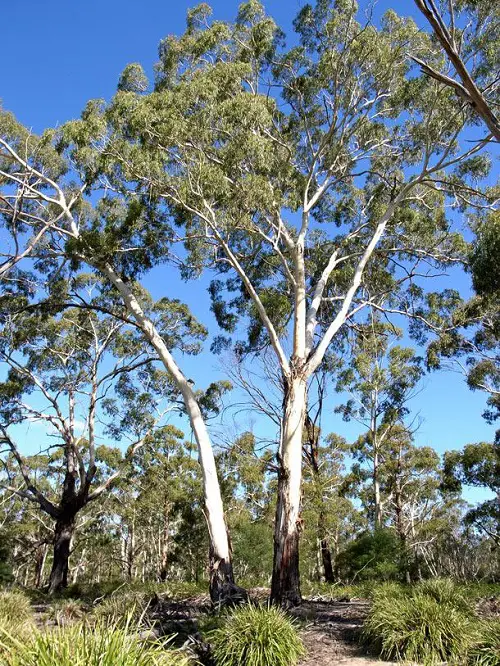
Botanical Name: Eucalyptus viminalis
Native to Australia, the Ribbon Gum tree grows to massive heights of over 300 feet! Its trunk sheds long ribbons and exposes a smooth, snowy bark—hence the name. Also known as manna gum, the bark exudes a crumbly substance with a pleasant and sweet taste, made up of unfermentable sugars.
Ribbon Gum is commonly used for timber, building, and joinery. It prefers moist, wet soil and tolerate drought to an extent, but cannot stand shade.
8. Rowan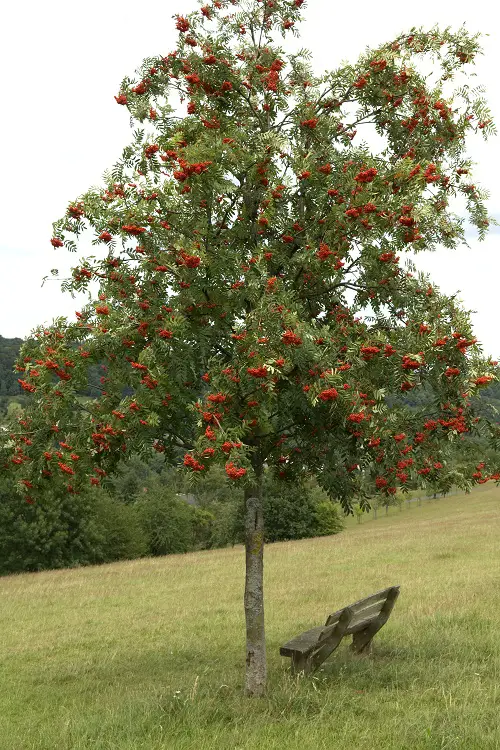
Botanical Name: Sorbus aucuparia
Another tree that starts with the letter R is Rowan, also known as Mountain Ash. This deciduous tree from the rose family has unique curving branches with yellow oval leaves that turn purple in fall, with tiny white and yellow blooms and red berry-like fruits.
Both its fruit and foliage are edible and often used in folk medicine. It thrives in chilly mountainous regions, adding colorful charm to harsh environments.
9. Roseta Rosewood
Botanical Name: Dalbergia latifolia
Also known as Indian rosewood after its origins, this grand, stately tree’s deep, rich-hued timber is prized worldwide in fine cabinetry and luxury furniture. The heartwood of this tropical tree is sweet and fragrant, often used in making musical instruments such as sitars and guitars, yachts, boats, veneers, etc.
Rosewood trunks yield wood with a lustrous finish and are exceptionally durable. However, it is a slow-growing tree protected by sustainable forestry programs to balance harvesting and conservation.
10. Royal Poinciana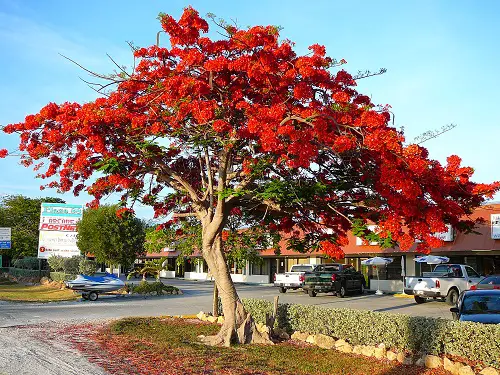
Botanical Name: Delonix regia
Royal Poinciana is a striking tree that exudes royalty through its broad, umbrella-like canopy and red-orange flowers. Native to Madagascar, it thrives in tropical climates and is often called the “flame tree” because of its fiery blossoms.
11. Rewarewa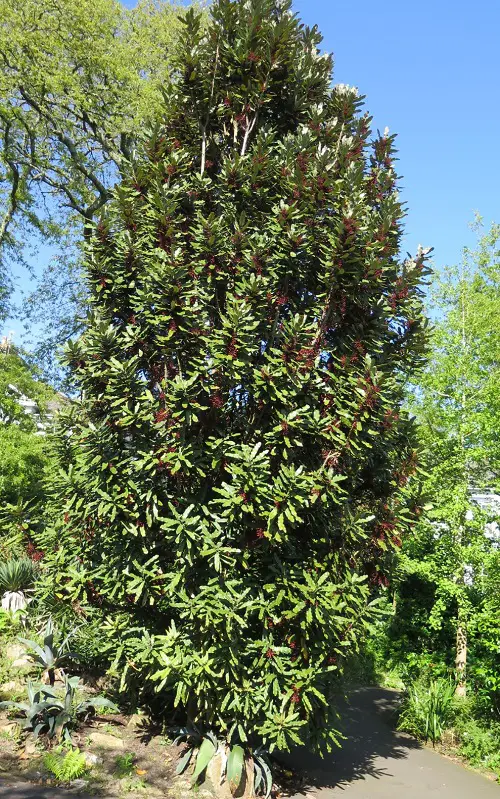
Botanical Name: Knightia excelsa
Rewarewa has a slender, tapering physical form that sets it apart from most other trees. Its 100-foot-tall branches have a fuzzy covering with reddish hairs. Although it is native to New Zealand, it is abundant in coastal and lowland forests around the globe.
The flowers of this indigenous tree, which produce furry red blooms in spring that resemble bottle brushes, are also used to produce honey.
12. Rubber Fig
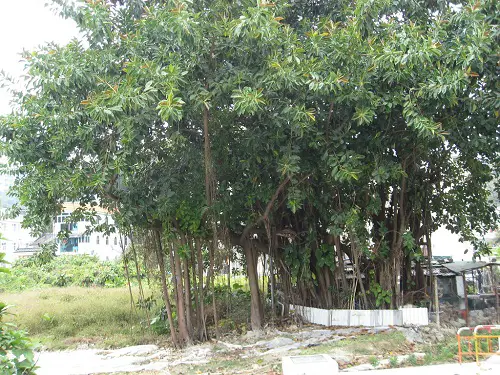
Botanical Name: Ficus elastica
The Rubber Fig is a large tree in the banyan family of figs that can grow up to 130 feet but it’s also grown as a houseplant. It features a broad, stout trunk and glossy oval leaves. Its strong aerial roots have even been used to form living bridges in Indian states like Meghalaya, which you’ll find to this day.
All parts of the plant comprise a milky latex used earlier to make rubber. However, it isn’t the same as the Para rubber tree, which contains the official latex used in making commercial rubber.
13. Rum Cherry Tree
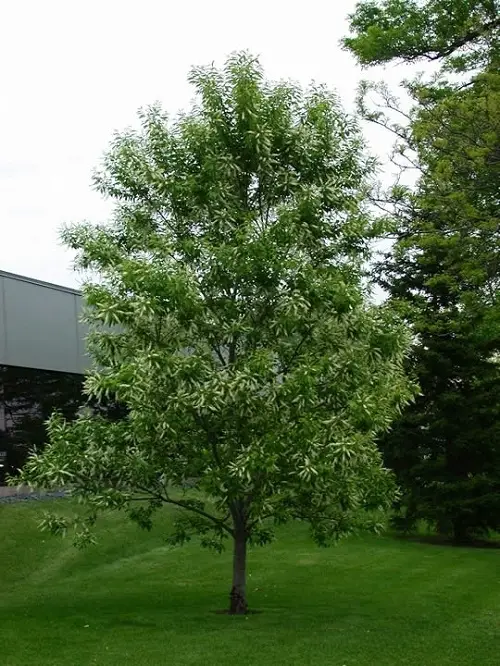
Botanical Name: Prunus serotina
Another member of the rose family that starts with the alphabet R is the Rum Cherry Tree. This rapid-growing forest tree’s foliage turns yellow and red during fall, and its cluster of tiny white blooms give birth to reddish black berries.
While used in wine, jelly, and for flavoring rum, studies suggest consuming large amounts of these berries could lead to cyanide poisoning!
14. Rata
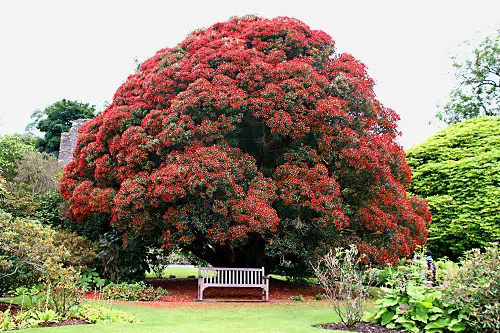
Botanical Name: Metrosideros umbellata
We have so many trees from New Zealand that begin with the letter R! The Rata tree has a thick, twisting trunk that often exceeds a meter in diameter. It features glossy, dark green leaves and bright red flowers that grow during winters in the region.
This tree can live over 1000 years, but sighting its blossoms is rare, as it occurs only once every few years.
15. Riberry

Botanical Name: Syzygium luehmannii
Riberry is a small to medium tree with flaky, reddish bark, glossy green leaves, and bright pink to red berries. It is native to the low-lying rainforests of Australia and is often planted in gardens as a hedge or topiary.
It produces creamy white blooms in spring, followed by its edible berries in summer, and grows best in fertile, moist, well-draining soil.
16. River Red Gum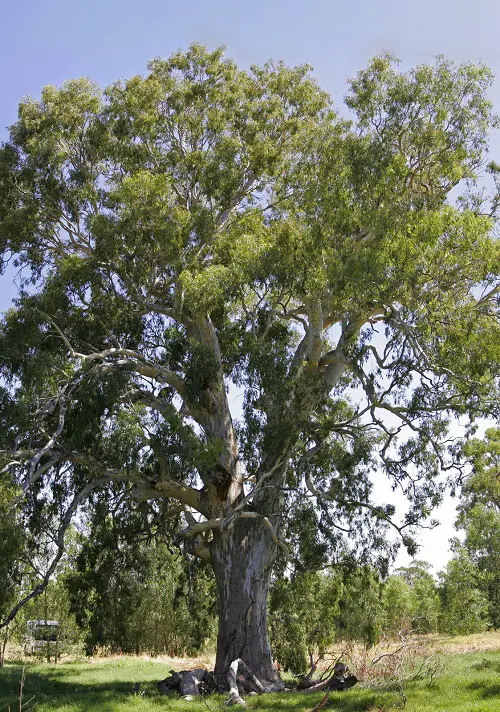
Botanical Name: Eucalyptus camaldulensis
River Red Gum is a tall tree that can grow up to 150 feet. It features smooth, mottled bark and long, narrow leaves and is commonly spotted along the riverbanks and floodplains of Australia. This one’s another old soul as it can live up to 1000 years.
17. Rusty Fig
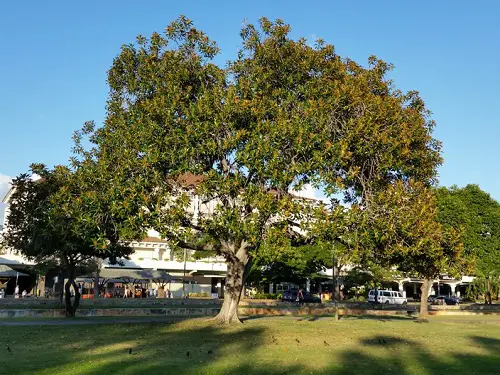
Botanical Name: Ficus rubiginosa
Looking like a giant green cloud emerging from a single trunk, the Rusty Fig is one of the hardiest rubber trees. It is known for its dense spread and smooth, oval foliage, which is green on top and brownish underside.
As it grows at a relatively slower pace, it is well suited for smaller areas. In their native region of eastern Australia, they are found in rainforests, gullies, riverbanks, and rocky hillsides.
18. Rocky Mountain Fir
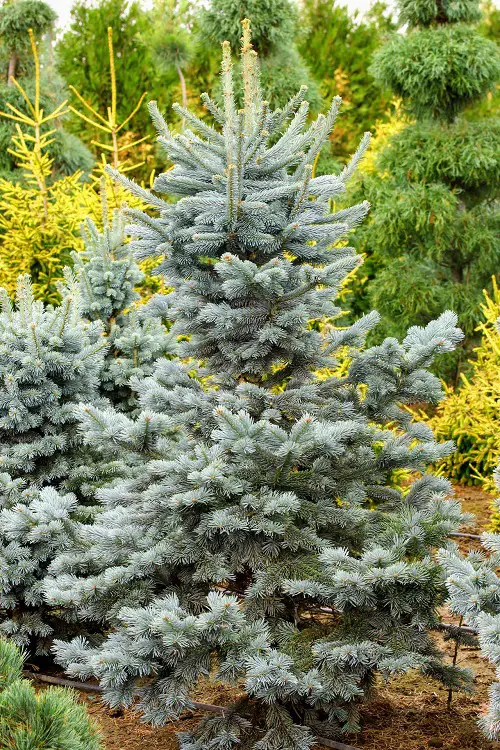
Botanical Name: Abies lasiocarpa
As the name suggests, this evergreen conifer is native to the Rocky Mountain range of North America. It usually grows up to about 66 feet but can sometimes scale up to even 160 feet! This tree looks down upon most others on this list not because of its colossal size but because it can be found at elevations up to 3700 meters from sea level in montane forests.
With sharp cone-shaped and bluish-green needle-like leaves, its timber is too fragile for woodwork or furniture.
19. Royal Palm
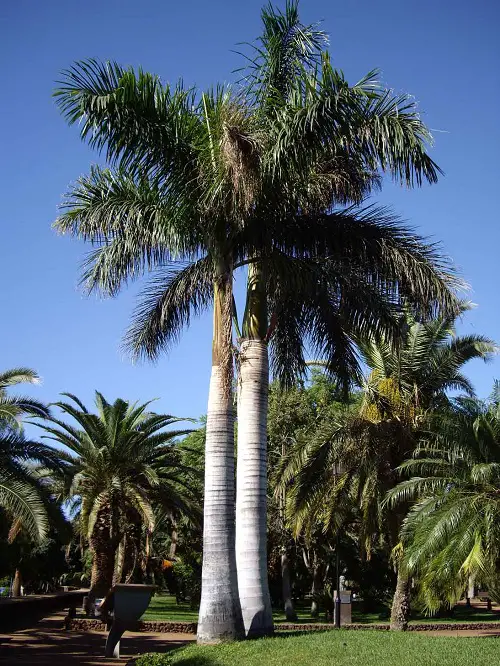
Botanical Name: Roystonea regia
If you live in a warm tropical region and want a large, attractive palm tree to beautify your backyard, the Royal Palm should be your go-to! Reaching up to 80 feet, this large and stunning palm has a stout, whitish trunk and lush compound leaves.
Its fruits are a food source for many birds and animals. Used in traditional medicine as well, it is largely an ornamental specimen and sometimes used for construction timber.


